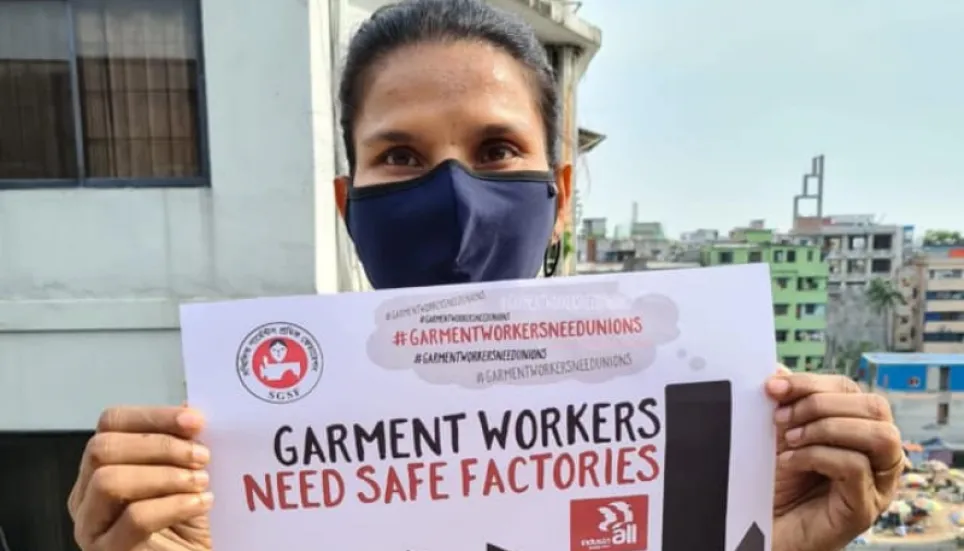Home ›› 23 Apr 2021 ›› Back

Ibrahim Hossain Ovi
Despite improvement in fire, electrical and building safety in the country’s apparel industry, trade union leaders and rights groups warned against complacency and pushed for continuous monitoring to avert the recurrence of accidents like the Rana Plaza tragedy.
The Rana Plaza collapse, the worst industrial disaster, raised questions about workplace safety and workers’ rights in the country's $28 billion garment industry, the lifeline of the economy.
Soon after the incident, in face of the mounting pressures from the local and rights group, the global brands formed two platforms with a legal frame to improve fire, electrical and building safety to ensure a safe workplace for the apparel workers.
Alliance for Bangladesh Worker Safety, a platform of North American apparel buyers and the Accord on Fire and Building Safety in Bangladesh, a platform of European buyers, worked for five years.
With these two initiatives and government steps, the apparel sector’s safety standards improved to a degree as factory owners remediated manufacturing units in line with the prescription of the platforms.
However, trade union leaders and rights groups now think there is no room for complacency with the improvement rather the sector needs continuous mentoring and gradual improvement to avert further disaster.
“We have seen improvement in safety standard with the help of brands, but it came at a cost,” Nazma Akter, President of Sommilito Garments Sramik Federation, told The Business Post. “There is no scope to compromise with the safety standards to ensure a safe workplace.”
“We have to ensure monitoring of safety issues progress already made through inspection of Accord and Alliance. If there is any kind of negligence in monitoring, it may lead to a further disaster worse than that of the Rana Plaza,” said the trade union leader.
There should be a legally binding monitoring mechanism. It could be the RMG Sustainability Council or the government-led initiative Remediation Coordination Cell, said Nazma.
The platform should ensure the standard already followed by the global retailer’s platform Accord and Alliance, she added.
Meanwhile, another trade union leader also said that the progress of the safety standard is on the verge of becoming meaningless.
“Rana Plaza was a homicide rather than an accident. This preventable disaster would not have happened if adequate safety measures and a strong monitoring system with the inclusion of workers' voices were in place,” said Kalpona Akter, President of the Bangladesh Garment and Industrial Workers Federation.
“The Bangladesh Accord has introduced and implemented these in the past eight years. If we want to prevent another Rana Plaza and sustain the positive changes, then we need a new Accord agreement to be signed by all brands sourcing from Bangladesh,” said Kolpona.
However, the sector people are saying that progress is being monitored through joint initiatives of brands, manufacturers and union leaders.
In June 2020, the country's apparel manufacturers, global brands, unions joined to form RMG Sustainability Council to sustain workplace safety, building upon the legacy of Accord.
“Safety improvement needed to ensure a safe workplace is done. What we need is the fine-tuning of those standards to progress,” Mohammad Hatem, First Vice President of Bangladesh Knitwear Manufacturers and Exporters Association told The Business Post.
But business insiders are not happy with the working pace of the RMG Sustainability Council as it is providing fresh Corrective Action Plans, which is not aligned with the country’s existing regulations, said Hatem.
They are sometimes prescribing safety equipment without proper assessment and later changing it, which cost a huge amount of money as well as time. This is hindering the completion and fine-tuning of the progress, the business leader claimed.
However, Iqbal Hussain, Managing Director of the RSC, did not respond to the call of this correspondent when contacted over the phone to comment on the issue.
“After the Tazreen Fashions and Rana Plaza incidents, the sector people made huge investments and worked in fire, electrical and structural safety. Through trial and error, there are lots of improvements and achievements in the sector,” BGMEA president Faruque Hassan told The Business Post.
In addition, the industry has its own electrical, fire and structural engineers to monitor, while the safety standards are strictly followed during the award of a licence to run the business as a member of the BGMEA, said Hassan, also Managing Director of Giant Group.
The sector is now technically sound as the sector people introduced the best solution to ensure workplace safety. Now, Bangladesh’s RMG industry is the safest in the world, said Hassan.
“We are working through RMG Sustainability Council, which has equal representation from buyers, owners and trade unions. It will continue and there will be no such incident in future as the improvement and monitoring continue,” he added.
Meanwhile, the government is also working to make the progress sustainable.
“Rana Plaza incident was a turning point for the Bangladesh apparel industry in terms of safety and labour rights issues. We have strengthened the Department of Inspection of Factories and Establishments,” said KM Abdus Salam, Secretary, Ministry of Labour and Employment.
In making the safety standard progress sustainable, the government is working through RSC and RCC to carry on the work of Accord and Alliance for the continuation of safety inspections, said Salam.
To improve the living standard of workers, the minimum wages have been increased while to ensure collective bargaining trade union registration process eased, said Salam.
He also said that the workers’ efficiency to participate in trade union and form trade union is not up to the market, which needs to be improved.
Trade union leaders have to make workers aware of their rights and encourage them to join the union.
Eight years ago, on April 24 in 2013, the Rana Plaza, which housed eight apparel factories, located in Savar collapsed, leaving at least 1,135 workers dead and over 2,500 injured.